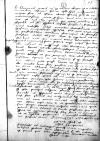Oraveram te, Domine mi, ex animo obnixe, ut a mittendis muneribus abstineres, sed ea epistula, quantum audio, nondum reddita fuit, cum istinc abiret ⌊Gemma⌋, qua de re vehementissime miror, spero tamen rem omnem esse tuto, est enim hic quidam, qui astitit ⌊Mechliniae⌋ 13 Aprilis, cum magnificus ⌊Egidius⌋, de quo tibi scripseram, fasciculum meum traderet cuidam mercatori Monosteriensi nomine Gosuino Lunijnckhusen, agnoscit puto vocem Westvalicam. Is proficiscebatur ⌊Mechlinia⌋ ⌊Antuerpiam⌋, ibi fortasse substitit diebus aliquot. Oro te ergo domine mi, ne illum bonum virum, qui virtutum tuarum admirator et praeco est maximus, inopem dicas, quin potius reice culpam in me, qui hoc illi iusseram, ne cuiquam nisi noto committeret propter binas litteras ad dominum ⌊archiepiscopum Londensem⌋, quas meae fidei commiserat ⌊Henemannus Rodius⌋. Quare precor, ut per ⌊Macquetum⌋ aut alium quemvis rescribere digneris, an iam acceperis. Si ego fortasse hinc afuero, mitte quaeso litteras ad ⌊Goclenium⌋ nostrum, ille curabit bona fide perferri eas ad me, quocumque loco fuero.
Nimia liberalitas tua mihi pudorem suffundit, ego totus tanti non sum, quantum simul mittis. Delectavit me tamen in ipso munere festivitas ingenii tui, quod potentissimorum principum nostrae aetatis ad me mittis numismata, conabar principio ipsi ⌊Gemmae⌋ reddere praeferenda rursum ad te, verum ille non audebat recipere, ubi autem legissem humanitatis plenissimam epistulam tuam et rem eleganter vidissem distributam, coepit mihi non tam aurum, quamvis fuerit plurimum, quam ipsa principum insignia placere, quare hac lege servabo, ut quam primum iterum aliquid miseris novi muneris (nisi forte plumbeam tui imagunculam), haec numismata una cum novo munere remittam, numquam didici accipere nec discere cupio. Amo te et, quoad vixero, amaturus sum propter varias nec vulgares virtutes tuas, quas primum fama didiceram et deinde praesentia, quae adeo, quamvis id evenire plerumque solet, famam non minuit, ut et auxerit propemodum in immensum.
Vale, domine mi, praesulum decus.

